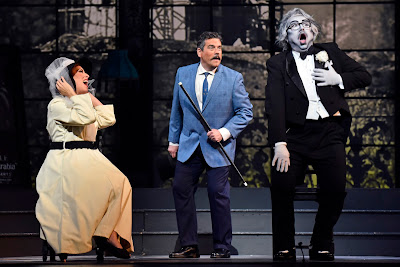 |
| Burak Bilgili as Don Pasquale and Ji-Min Park as Ernesto |
Hudson’s concept imaginatively incorporates the black and white celluloid world of the silent film era to identify Don Pasquale as “The Sovereign of the Silver Screen”. When the vibrant overture began, Hudson gave his audience black and white movie magic with Don Pasquale starring in the title role of his most celebrated film, “The Sheik of Arabia”, a hoot of a start using old footage and fake superimposed characters. More of those celluloid divertissements popped up later and kept up the fun act.
But when the curtain goes up, Don Pasquale’s star has long faded and he’s living in his long-gone Oscar-winning glory surrounded by shelves of old movie reels in a home with a view to the Hollywood sign as part of Peter Nolle’s smart-looking designs, Kathleen Trott’s period-appropriate costumes and Eric Watkins’s crisp lighting. Interestingly, as the plot unfolds, Pasquale's world around him transitions from black and white to technicolor and with it the out-of-step geriatric appears sadly left behind.
 |
| Audrey Luna as Norina |
The work’s melodious array of arias, duets, trios and quartets were showcased excellently, brimming with vitality and astute vocal balance. The precision between stage and pit lapsed occasionally in the prestissimo runs but conductor Joe Illick otherwise brought out the lovely lyrical aspects while guiding the well-supported sound of Fort Worth Symphony.
Richly fortified Turkish bass-baritone Burak Bilgili instantly set the antics alight as the spright and elderly, pallid and bespectacled Don Pasquale. Bilgili sang the Italian lines with zinging articulation and characterful expression, projected with a big throaty resonance and adeptly portrayed an old man deciding to take a young bride with self-entitled celebrity flair. But, despite his creepy and lecherous ways, there's an ounce of sympathy Bilgili makes you have for him.
 |
| Audrey Luna, Andrew Wilkowske and Burak Bilgili |
On this note, the downside was that poor Ernesto’s mostly offstage aria, “Com'è gentil”, was laughed all over but Korean tenor Ji-Min Park had already won his audience over with his youthful innocence and thrilling adrenaline-rich tenor. Doing so in the unequivocal opening night highlight with Act 2’s lament, “Cercherò lontana terra”, Park both movingly and humorously portrayed Ernesto’s despair in believing he was no use to his sweetheart Norina and powerfully embodied a yin and yang like inseparability of tragi-comedy as he made one failed suicide attempt after the other - a scene that came with the kind of subtlety and depth that parts of the performance missed.
 |
| Ji-Min Park and Audrey Luna with Fort Worth Opera Chorus |
But the party of pop cultural icons made no convincing reason for taking the place of Sofronia’s (Norina’s) newly hired servants in the original. And as brilliantly shaded and secure as the chorus work was, the likes of Groucho Marx, Carmen Miranda, James Dean and Elvis Presley, amongst others, made lukewarm representations.
Still, Donizetti’s ‘opera buffa’ comes up trumps. Simply delighting in its fabulous singing is enough to recommend it but you get to laugh when you might least expect to and that surprise alone is priceless.
Don Pasquale
Fort Worth Opera
Bass Performance Hall
Until 6th May, 2018
Production Photos: Ben Torres
No comments:
Post a Comment